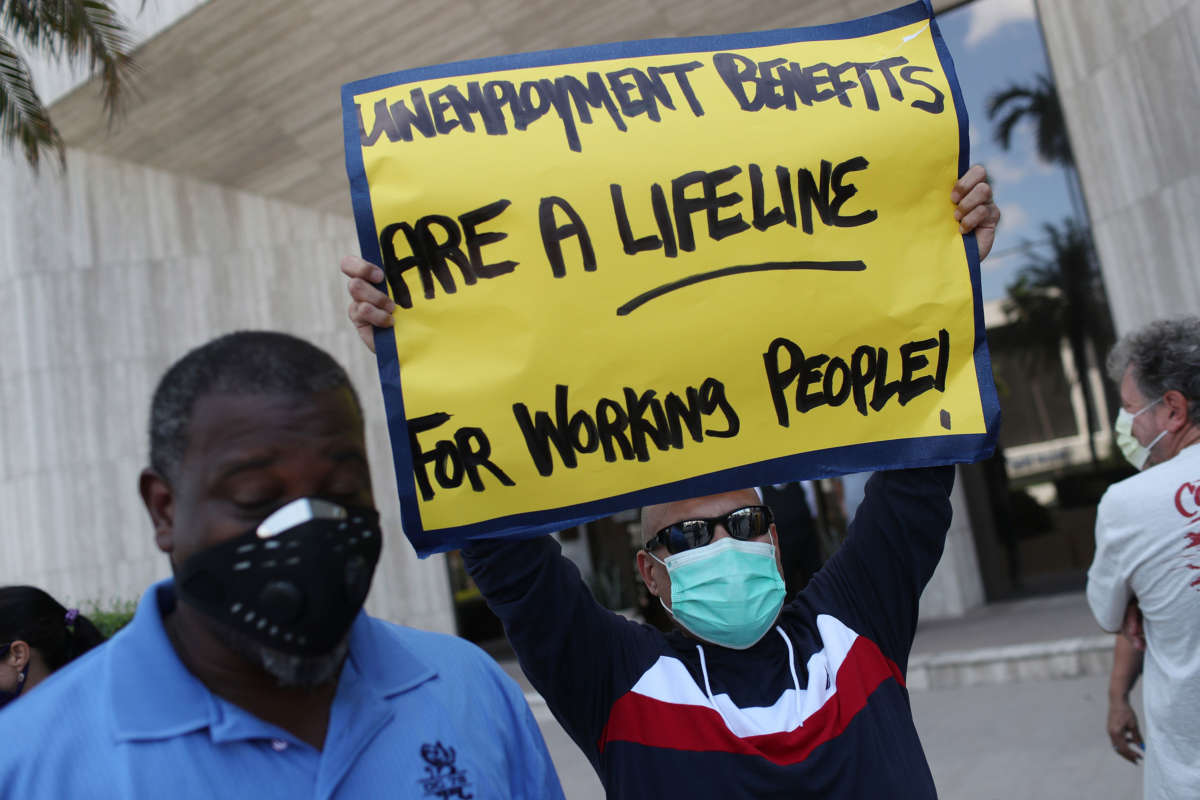Did you know that Truthout is a nonprofit and independently funded by readers like you? If you value what we do, please support our work with a donation.
With the final boosted unemployment check set to go out in just three days barring an unlikely last-minute extension by Congress, Senate Republicans are reportedly considering a proposal to slash the $600-per-week benefit boost to $100 — a cut that would drastically reduce the incomes of 30 million Americans and potentially cause massive job loss.
First reported by CNBC Wednesday, the Republican proposal comes as progressive advocacy groups, Democratic lawmakers, and economists are warning of the devastating consequences of letting the enhanced unemployment payments expire at the end of the month. The Republican plan would pay out the $100-per-week boost through the end of the year.
The $600 weekly benefit increase technically expires on July 31, a Friday, but because states pay unemployment benefits on Saturdays or Sundays, the last enhanced payments are set to go out on July 25 and 26. Talks over the next Covid-19 stimulus package are expected to stretch into August, meaning unemployment benefits will likely revert to pre-pandemic levels — which averaged around $370 per week nationwide — for at least one payment cycle.
Sparking warnings of a major housing crisis, expiration of the supercharged unemployment benefits is set to coincide with the end of an eviction moratorium shielding more than 12 million people who live in homes with federally backed mortgages.
Rep. Don Beyer (D-Va.) said the $100-per-week proposal shows “Senate Republicans are wildly out of touch with reality.” If adopted, the GOP proposal would reduce the monthly payments to millions of out-of-work Americans from $2,400 to $400.
“Seriously, just $400 a month?” Beyer tweeted late Wednesday. “Cutting monthly income for 30 million families by $2,000 would cost the country millions of jobs. This wouldn’t just be horrible governance, it would show contempt for the American people.”
Economic Policy Institute research director Josh Bivens estimated that reducing the weekly unemployment insurance (UI) boost from $600 to $100 would cost the U.S. more than four million jobs over the next year.
“Both cruel and stupid,” Bivens said.
At the end of the week, supercharged unemployment benefits will start expiring for millions of Americans. It’s time for Senate Republicans to put partisan games aside and #ExtendUI. The entire economy depends on it.
— Ron Wyden (@RonWyden) July 22, 2020
Negotiations over the next coronavirus stimulus package are still in flux as Republicans, Democrats, and the White House remain miles apart on key issues, including the unemployment benefit boost. According to the Associated Press, Senate Republicans appear to be leaning toward cutting the $600 weekly payment to $200 — still a sharp income cut for tens of millions of people.
Politico reported late Wednesday that “many rank-and-file Democrats say they are willing to compromise on the extra $600 per week, saying they would be open to less money as long as there is no lapse in benefits. Others say they won’t back down on that number.”
Senate Majority Leader Mitch McConnell (R-Ky.) is expected to roll out the GOP package on Thursday, two days after laughing off the possibility that any Covid-19 legislation will pass by the end of next week.
On Wednesday afternoon, protesters marched to McConnell’s home in Washington, D.C. demanding an extension of the $600-per-week UI boost.
“Without the $600, we would be in dire straits,” one protester told a local ABC affiliate. “With the kids being home during the pandemic, it helps an awful lot, because there’s always something needed, there’s always something that has to be done.”
Holding Trump accountable for his illegal war on Iran
The devastating American and Israeli attacks have killed hundreds of Iranians, and the death toll continues to rise.
As independent media, what we do next matters a lot. It’s up to us to report the truth, demand accountability, and reckon with the consequences of U.S. militarism at this cataclysmic historical moment.
Trump may be an authoritarian, but he is not entirely invulnerable, nor are the elected officials who have given him pass after pass. We cannot let him believe for a second longer that he can get away with something this wildly illegal or recklessly dangerous without accountability.
We ask for your support as we carry out our media resistance to unchecked militarism. Please make a tax-deductible one-time or monthly donation to Truthout.
